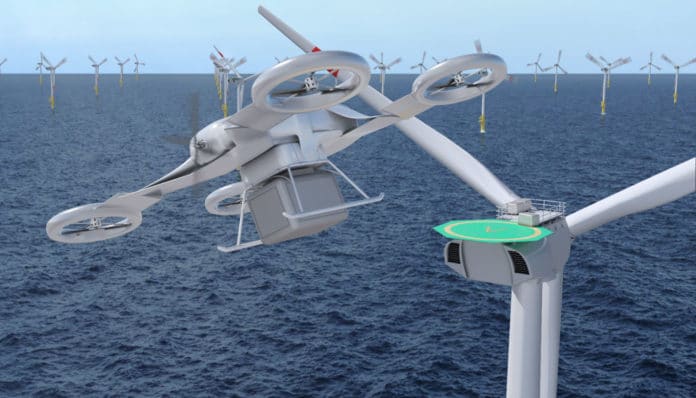The German Federal Ministry for Economic Affairs and Climate Protection is funding a new three-year research project called Drones Wind Farm (UDW) on the use of passenger-grade air taxis and cargo drones to complement helicopter and ship deployments for maintenance services required by offshore wind farms.
Wind turbines are among the most important technologies for a sustainable energy supply. In the case of offshore plants, maintenance teams and materials have to travel long distances to reach the site, which results in high time and cost requirements.
Could drones provide a safe and effective alternative to sending out ships, helicopters, and cranes in the future, and could they take some of the pressure off of maintenance staff? This is what the researchers will be investigating as a part of the new project, jointly conducted by the German Aerospace Center and energy supplier EnBW Energie Baden-Württemberg AG.
Engineers working on the project envision using cargo drones to transport tools and materials directly to the top of a 100-meter wind turbine, eliminating the need for cranes. If service technicians were to travel by air taxis, there would be no need for transfers to the turbines and two-week shifts with overnight stays at sea.
“As the operator of offshore wind farms, we would like to contribute to making these new logistics approaches a standard service worldwide,” says Dr. Michael Splett, Head of Offshore Operations at EnBW.
“Our role is to bring wind energy and cargo drone technologies together and address a number of fundamental challenges. Among the issues to be clarified are how offshore wind farms need to be equipped to enable the use of drones, what a drone landing platform could look like, how a transport container needs to be designed, and what communication interfaces could look like,” explains Jonas Janke, responsible project manager, and an offshore specialist at EnBW.
The research project also aims to explore the legal framework for operating transport drones at offshore wind farms and identify any as yet uncovered legal aspects for this application or conflicts with existing regulations.
The scientists are currently conducting experiments with a DLR drone on a wind farm on land. This will help engineers come up with a model for operations in the offshore area and examine it in detail using complex simulations.
The project partners are also planning on the Offshore Drone Challenge (ODC), where drone manufacturers and service providers will have the opportunity to present their products as suitable solutions during a call for proposals. The first ODC workshops will be held in the fall at Hamburg Wind Energy 2022.
